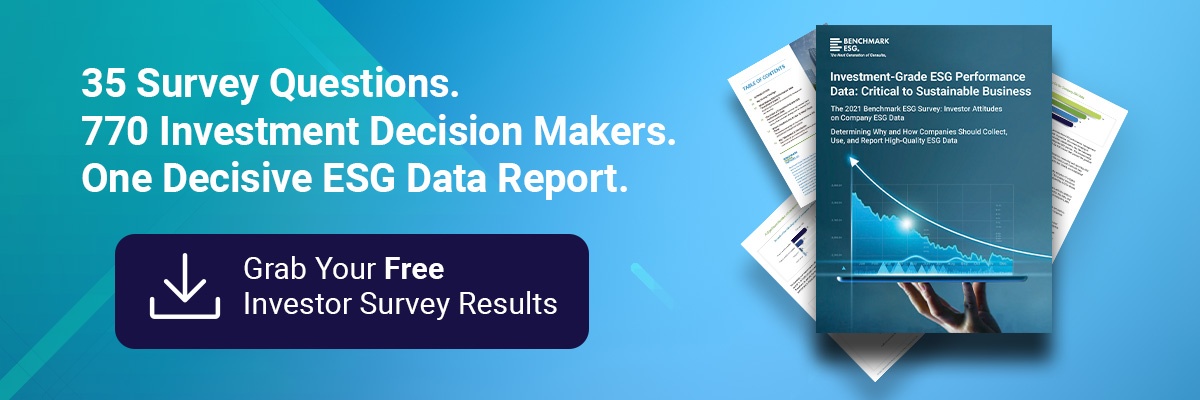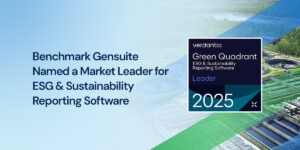In recent years, more companies have focused on Environmental, Social & Governance (ESG) initiatives, driven by key investors and stakeholders. This is propelling organizations to not only reevaluate methods by which they measure and report their risk, compliance, sustainability, and stewardship performance, but also how ESG can be incorporated into their culture to achieve their organizational commitments.
In May of 2022, we hosted our annual Benchmark Gensuite® Impact Conference in Orlando, Florida. Over the course of three short days, we covered a wide range of topics from Sustainability & ESG Impact to Operational Excellence & Compliance with 327 attendees, 57 speakers and presenters, and 25 sessions. Topics included the proposed SEC rules on Scope 3 emissions, as well as new regulations and mandates in the UK, Canada and the European Union.
The ESG landscape is always evolving, with new innovations in ESG reporting tools and an increased focus on investment-grade ESG performance data. These continual changes are why we wanted to share with you some of our key takeaways for a successful ESG digital transformation.
5 Key Takeaways for Successful ESG Digital Transformation
1. Making the Case for Environmental, Social, Governance (ESG).
About ten years ago, the market was in a “steady state” when it came to bringing corporate sustainability and environmental objectives through to fruition; however, a fundamental shift has occurred in recent years and has expanded to include social concerns and corporate governance practices.
This focus on ESG is being driven by the financial and investment sectors and is flowing through to the corporate marketplace at an accelerating rate, where organizations will now need to take necessary steps to ensure that they deliver on their ESG commitments.
Technology Entrepreneur and Energy & Environmental Policymaker Andy Karsner said during his keynote speech at the 2022 Benchmark Gensuite® Impact Conference, “The ESG movement is not going anywhere. More than absolute prosperity and growth, Americans— really, everyone in the world— actually treasure a degree of stability and predictability and the methodical pursuit of what is good and what is right: for your families, for your communities, for your country, for the world.”
2. ESG Responsibilities Often Cascade from the C-Suite to the EHS Leader.
While good ESG reporting is truly a cross-functional endeavor, EHS & Sustainability leaders are increasingly being asked to deliver on ESG performance indicators & program initiatives. EHS and sustainability management systems provide a foundational system of record when it comes to reporting ESG program performance and responding to requests from financial or leadership stakeholders.
David Metcalfe, CEO of Verdantix, explains, “We are seeing more CEO-lead sustainability strategies, cascading down to the requirement for comprehensive ESG or corporate sustainability data systems […] This provides a fantastic opportunity for people in EHS roles – who have already proven themselves to be brilliant leaders through the pandemic – to leverage those digital investments already made and reassuring the C-Suite that they can solve the problem.”

3. ESG is a Dynamic Landscape, Bringing Great Challenges & Opportunities.
With a growing number of ESG reporting frameworks and various internal and external stakeholders requesting performance disclosures, developing successful ESG reporting tools can seem like a moving target.
In Blackrock’s 2020 Global Sustainable Investing Survey, it was noted that 53% of respondents cited the poor quality or availability of ESG performance data and analytics as the biggest barrier to deeper and broader implementation of sustainable investing.
Creating a system of record that can be used to compile and verify investment-grade ESG performance data, actively monitoring changes, and ensuring that your organization has processes and systems in place to address them can help your organization stay on track to achieving your ESG targets & commitments.
As Herman Baker, Corporate EHS & Sustainability Director of Carestream, remarked during the guest panel at the 2022 Benchmark Gensuite® Impact Conference, “You need to create an ESG framework. ESG and EHS in general involve everybody now.”
4. ESG Digital Transformation & Advanced Technology Are the Keys to Long-Term Success.
The year 2020 proved to be one where technology adoption was necessitated to enable a remote workforce and ensure business continuity. Organizations that had already either begun their ESG digital transformation journey or had plans to expand the use of technology throughout the enterprise were much more resilient and capable of quickly addressing the immediate workplace risks posed by the pandemic; a similar digitization approach should be incorporated into a company’s ESG strategy.
In a recent study conducted by Florida State University and the McNees Group, the leading barrier to investment-grade ESG data was the lack of digital technology and tools for quality data collection. According to the ESG Reporting Survey released by the team, 54.1% of companies are still managing their ESG data through spreadsheets; while 30% of respondents said data management was their most challenging aspect in ESG reporting.
ESG software of today is increasingly expected to utilize advancements in technology. Artificial Intelligence (AI), machine learning, the Internet of Things, and Virtual and Augmented Realty are paving the next generation of data. AI, in particular, is at the forefront, enabling users to reach beyond the standard capabilities of data collection, reporting and analysis to gain clear and actionable insights. This will not only impact the future of analytics for areas such as incident management and chemical risks, but also extend to ESG-related solutions such as sentiment analysis for employee and safety culture.
5. Operationalizing ESG is Critical to Delivering on Your Commitments.
It’s not enough to simply report your ESG metrics; ESG commitments need to be drilled down to the point of action and integrated into the company’s culture to enact meaningful change. Having a partner in this ESG transformation journey is also essential to success.
Benchmark Gensuite® Founder & CEO, R Mukund, states, “We have developed both a methodology and a technology: distilling the business process, finding the essence of it, engaging people and driving accountability and ownership and ensuring that we are getting people to deliver toward the business objectives through collaboration and a sense of community. We are looking to take these same lessons learned and apply them to the ESG world.”
Contact us if you would like to learn more about how Benchmark Gensuite® software, how we can partner with you in your ESG digital transformation, and help build on your environmental, safety, occupational health, quality, operational reliability and security, sustainability, product stewardship, and responsible sourcing excellence programs!



